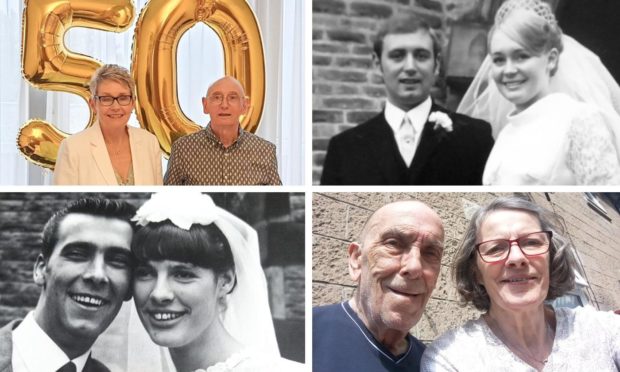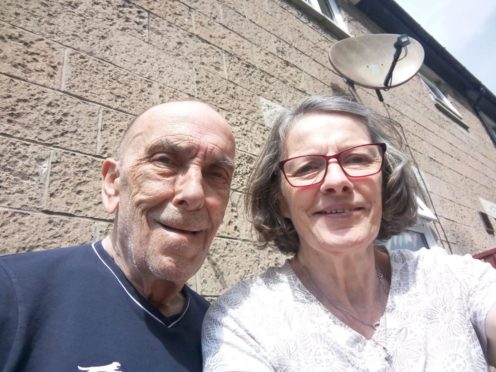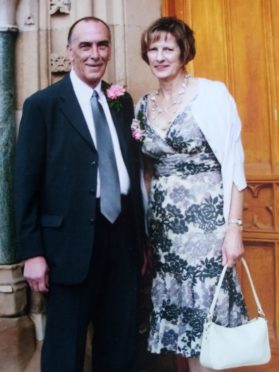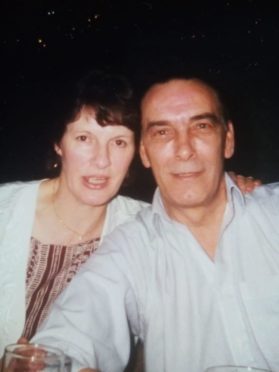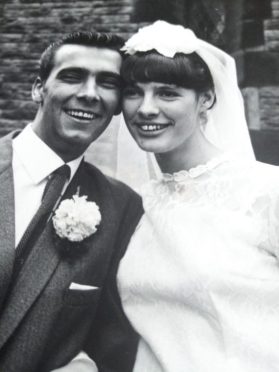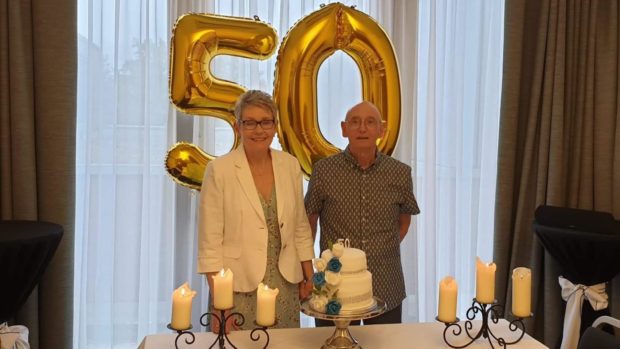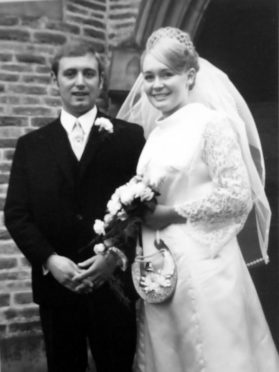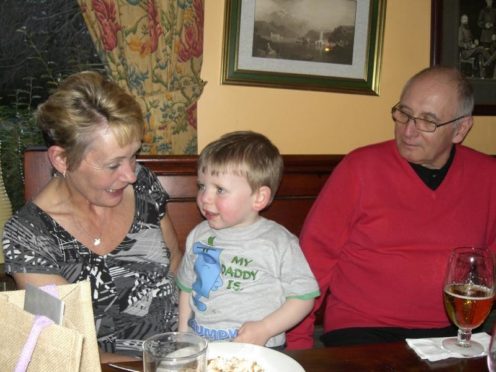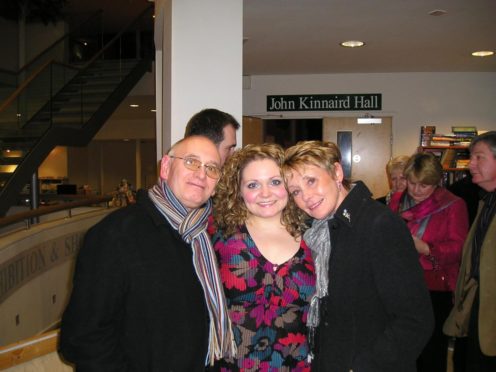Anne Ferrier’s story is a picture familiar to many who are carers for husbands, wives and family members with dementia.
While speaking to a neighbour one day, Bob went to take the bin in from the street.
Anne, from Dundee, and the neighbour told Bob it hadn’t been emptied yet and to leave it out for the rubbish collectors.
Anne went back into the house, thinking he was behind her. But when she looked outside, Bob was across the road taking another neighbour’s bin in for them.
Remembering the incident, Anne says: “I had to go out and shout again ‘Bob leave that, it hasn’t been emptied yet’.
“This was how I knew he was getting worse. He was always so good with the bins.”
Anne has been providing care for her husband, Bob, since 2018, when he was diagnosed with dementia.
Dementia is not an inevitable part of ageing but as life expectancy steadily increases, so does the number of people living with the condition.
Anne remembers: “I was at my wits’ end with what was happening. He’d had it a while before being diagnosed but wouldn’t go to the doctor. He was adamant there was nothing wrong with him.
“When he was diagnosed, we found out he’d had a mini stroke earlier in the year. He had really bad mood swings at the start.
“I don’t know if he was angry about the disease, but that was hard to handle.”
Dementia symptoms gradually progress and deteriorate over time, something Anne has noticed in Bob.
Dementia affects the person who is diagnosed but also their loved ones and support system, too.
Besides memory loss, the lesser-known symptoms of dementia can include changes to personality and a reduced sensitivity to others’ feelings.
This can have a huge impact on the friends and family members of those diagnosed.
Thankfully, local support from the Dundee Dementia Resource Centre (DDRC) has meant that Anne and other carers have a place to receive advice and solidarity from others in the same situation.
Anne explains: “The centre has been a really terrific help. I go to a couple of the online sessions, and it takes me away, relaxes me and gives me a break for an hour.
“I go to the online café and I get to chat to the other ladies. When you go to these groups, it just gets you away from things for a little while.
“I miss everyone at the group, it’s great for a chat and you pick up tips from the others. It’s good knowing that someone understands what you’re going through.”
Many of the conversations that take place around dementia spotlight the changes and difficulties that come with diagnosis, but much stays the same, too: Bob still loves football and playing pool, and is raring to get back to the DDRC where he can showcase his skills and knowledge in both.
And in July, Anne and Bob will celebrate their 54th wedding anniversary.
When a loved one is diagnosed with dementia, the road ahead can feel daunting. But Anne and Bob are proof that it is possible to live well with dementia.
Anne says: “You just have to try to keep going and try not to get stressed.
“It does have a strain on you, but you just try and laugh about things and keep it cheery if you can.
“You’ve got to try and look on the funny side. Lately we’re having more laughs than not – he used to get annoyed with himself or get confused.
“We manage to laugh at a lot of things and even some of the mistakes he laughs at now. Sometimes it’s tough and other times you get a laugh.”
Doris Boag and her family first noticed early symptoms of dementia in her husband Joe in 2018.
It would take another two years for a GP to reach a diagnosis, which eventually came right before the country went into national lockdown in March 2020.
Doris explains: “Emotionally it can be quite difficult. Over the last few months he has changed a bit.
“It’s actually hard to put into words. You can have a discussion and then 10 minutes later, the same topic will come up and he has a completely different opinion.”
Doris met Joe at 16 when she got a part-time job in his father’s ice cream shop.
Initially, she told Joe he was too old for her, but their relationship soon flourished and the couple have now been married for more than 50 years.
For Doris and many other carers, one of the main issues is the lack of time for themselves – something made worse by the pandemic.
Places such as the DDRC would usually provide respite for carers to do something they love or even complete jobs and chores they otherwise don’t have time to do.
But with many services closed due to the pandemic, it means carers are essentially on duty 24/7.
One of the hardest things for Doris is the lack of independence.
With Joe’s dementia deteriorating, he doesn’t like being left alone at home and he has become used to Doris being in all the time due to lockdown.
Doris continues: “Over the last 15 months we haven’t been able to do very much or go very far.
“I have friends who, prior to all this, I would meet for coffee, or I would go out on my own and Joe would do his own thing.
“But he doesn’t want me to do that now. He doesn’t like to be in the house by himself.
“I’ve been invited for lunch on Friday afternoon and I have had to really seriously think about how I’m going to do that.
“I’ve got my grandson coming but Joe isn’t happy about that either because he’ll tell you he doesn’t need him to come round, but in the next breath he’s saying he doesn’t like being on his own.
“Prior to lockdown, I used to go out for an early morning walk every day, but he doesn’t like me doing that anymore.
“I’ve had to curtail that a little bit. But now that the weather is getting better, I do feel that I’m going to have to take a stand and just go.
“He usually sleeps quite late in the mornings so hopefully I can get out and he doesn’t notice. But if the phone was to ring or the doorbell was to go, that wouldn’t be good.”
The challenges facing dementia carers before, during and after the pandemic are immense, but there is support on hand for those who need it.
Doris says: “My friends and family say to me ‘don’t be too hard on yourself and don’t expect to be able to cope with everything every day’, because every five minutes can be different. You just have to be kind to yourself.
“You can’t beat yourself up if things go wrong – as carers, we’re left thinking ‘I shouldn’t have said that, I should have done that’, but for the person living with dementia, they just forget.”
For support from Alzheimer Scotland, call the 24-hour Freephone Dementia Helpline: 0808 808 3000.
